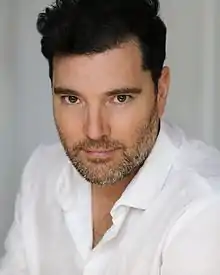Edward Docx
Edward Docx (born 1972[1]) is a British writer. His first novel, The Calligrapher was published in 2003. He is an associate editor of Prospect Magazine.
Edward Docx | |
|---|---|
 Edward Docx in 2017 | |
| Born | 1972 (age 48–49) Newcastle |
| Occupation | Writer |
| Nationality | British |
| Notable works | Novels: The Calligrapher, Pravda, The Devil's Garden, Let Go My Hand Essays: Postmodernism is Dead, Walking with Karl, The Peak |
Biography
Docx was born in Newcastle. He was educated at St Bede's College in Whalley Range in south west Manchester and then at Christ's College, Cambridge,[1] where he read English Literature and was President of the JCR.[1]
His mother was a classical music agent and is Russian.[2] He is the eldest son of a family of seven children and has described his upbringing as eccentric.[3] [4]
Works
Edward Docx's first novel, The Calligrapher (2003), was short-listed for both the William Saroyan prize[5] and the Guilford Prize. The San Francisco Chronicle called it the best debut book of the year.[6]
This was followed by Pravda (2007, entitled Self Help in the UK), which was long-listed for the Man-Booker Prize (2007)[7] and won the Geoffrey Faber Memorial Prize (2007).
His third novel was The Devil's Garden (2011), which is in production with Mandabach Productions.
His fourth novel, Let Go My Hand, was published in April 2017 (also by Picador).
Docx's work is often extremely well received by critics in the UK[8][9] and America.[10][11] The New York Times has described him as 'fiendishly clever'[12] and The Independent as a 'virtuoso phrasemaker' and one of the most humane writers of his generation.[13] Docx was cited as one of the 21 most gifted young writers from around the world by The Hay Festival Committee (2008).[14]
Docx also works as a screenwriter for television and film. He has co-written several film scripts with the Australian director PJHogan and has worked with Ringside Productions on television drama in the UK.[15]
Themes and style
Docx's novels are very different from one another in range, scope and subject. But all three deal broadly with antiphonal themes of masculinity and femininity, atheism and religious belief, love and desire, and all three are peopled with opposing moral and amoral characters who are uncertain actors in their own lives. His work is generally considered literary and though contemporary in tone and concern, it is evidently aware of both novelists and poets from the canon – explicitly so in the case of The Calligrapher, which centres on the poetry of John Donne.
Docx has been compared to writers as diverse as Dickens,[8] Dostoyevsky[10] and Coetzee.[16] And his writing is often praised for its descriptive skill.[17] But his work is chiefly noted for its vitality and the attention given to character as well as style: 'Docx has a gift for assessing “the exact shape and weight of other people’s inner selves, the architecture of their spirit” and even his most ancillary characters flare into being, vital and insistent.' The New Yorker.[18]
Quotes
"All art is philosophy and all philosophy is political."[19]
"Half the world is screaming for water and freedom while the other half is ordering cocktails and complaining about the service."[20]
Journalism
Docx has contributed to most of the leading British and American newspapers and magazines. In the UK, his journalism most often appears in the Guardian,[21] the New Statesman [22] or Prospect magazine.[23] Docx was short-listed for The George Orwell Prize for Journalism in 2012.[24] He was short-listed in 2014 for the Foreign Press Association Feature of the Year.[25] In 2015, he was again long-listed for the George Orwell Rowntree Prize.[26] He has worked in The House of Commons and has interviewed several of the British party political leaders.
Criticism, Radio and Television
Docx reviews contemporary fiction for The Guardian.[21] He has also worked extensively on television and radio. He presented his own show for BBC Television[27] and BBC Radio.[28] He has written widely on the cultural importance of literature and is a regular teacher of The Guardian's Masterclass series on fiction.[29]
Politics
Docx campaigned publicly for the UK to Remain in the European Union.[30]
References
- Booker Prize: Edward Docx- a Lothario to love – Telegraph
- "Archived copy" (PDF). Archived from the original (PDF) on 26 December 2011. Retrieved 17 December 2012.CS1 maint: archived copy as title (link)
- Interview The Guardian – https://www.theguardian.com/lifeandstyle/2007/jul/21/familyandrelationships.family
- William Saroyan International Prize for Writing
- Search | The Man Booker Prizes
- The Guardian
- The Guardian
- The Washington Post
- Literary Night Tue 24th Jan | Whirledart
- The Independent
- Short Lists | The Orwell Prize Archived 2 December 2013 at the Wayback Machine
- Guardian Masterclasses